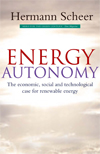 Article published in Scheer, H. / Ghandi, M. / Aitken, D. / Hamakawa, Y. / Palz, W. (Ed.): The Yearbook of Renewable Energies 1992: Solar Energy – What are its Driving Forces ?, London, 1992
Article published in Scheer, H. / Ghandi, M. / Aitken, D. / Hamakawa, Y. / Palz, W. (Ed.): The Yearbook of Renewable Energies 1992: Solar Energy – What are its Driving Forces ?, London, 1992A retrospective view of Rio - Editorial
The failure of the Rio Conference was written into its Agenda! Agenda 21 lists the official main issues of the conference: climate change, ozone layer depletion, trans-boundary air pollution, land degradation, soil loss, desertification, deforestation, loss of biodiversity, biotechnology risks, freshwater availability and pollution, marine pollution, depletion of marine living resources, toxic chemicals, hazardous wastes, along with "trans-sectoral issues," such as: unsustainable consumption patterns, demographic pressures, poverty, quality of the living environment, health, condition of women and children, vulnerable groups, international economic environment and food security.
Of course, all these "issues" are important. However, a decisive flaw in this manner of theme-setting is immediately evident: endeavoring to focus on 21 points means, in fact failing to focus on anything. Faced with such a huge catalogue of tasks, one doesn't know where to begin. Political systems also have a limited capacity for dealing with problems. If equal importance is given to everything, it is usually the case that nothing gets done; at the most, the problem is looked at very superficially. It is common experience that, what we are left with, is a "politics of muddling-through." This impedes the implementation of a really ambitious new strategy, for which there was never a greater and more important need.
However, political experience shows that every now and then, great new plans have been drawn up and realized when political institutions have concentrated their efforts on a central goal, thus enabling wide ranging changes in an unexpected short period of time. In this context, it is essential to recognize the correct priority, one which is not only essential to the solution of many problems, but which directly and indirectly generates comprehensive changes in various individual fields. We are looking for the key to the door which will enable us to escape from the cul-de-sac in which we are stuck, and which will open up a new combination of life- chances for us. This key is solar energy.
If we take a second look at "Agenda 21", we realize that nearly every problem is basically one of energy supply: The climate change follows on the combustion of fossil fuels and the additional heating of our atmosphere due to nuclear power plants; The ozone layer depletion is mainly caused by CFCs used in modern cooling systems; the transboundary air pollution from the provision of nutritional energy for the energy converter, man; the deforestation by acid rain generated by our unsustainable consumption patterns; the land degradation and soil loss for the production of nutritional energy and the desertification and deforestation caused by the need for fuel-wood; The transboundary air-pollution occurs due to the use of fossil energy in factories and in traffic systems along with the release of radio-activity from civil and military atomic energy systems.
The soil-loss and marine-pollution are not least the results of the highly concentrated deployment of organic and chemical energy, of oil leakages and again of acid rain - biotechnology risks. The desertification is mainly a follow-up to the complete exploitation of the vegetation leading to a loss of biodiversity, to satisfy the insatiable need for nutritional- or combustion-energy, given the lack of other energy sources. The lack of the availability of freshwater and marine pollution caused by shipping mainly stem from toxic chemicals and hazardous wastes, as does the depletion of marine living resources. The unsustainable consumption patterns of the modem consumer have become especially dangerous, thanks to the orgies in the consumption of energy in which he/she indulges. The central reason for the demographic pressures lies in the fact that, given the lack of the availability of other energy sources and systems, the classical way out is sought, that is to say, an increase in human industrial energy. Poverty is most prevalent in those regions of the world, which are deficient in energy sources and services (the basis for every economic development) due to the insurmountable costs and the associated flagrant injustice in the distribution of energy provision. The fact that the quality of the living environment and health are greatly impaired by the present provision of energy, in an age of smog-bound cities, of Hiroshima and Chernobyl, does not need to be stressed here.
The present energy sources in use are the main cause of the fatal global environmental threat. Whoever sees this question as just being one among many, a single issue, has failed to understand the basic meaning of the energy question. Whoever deals with "energy-politics" or "energy-economics" as with one of many political or economic areas, has failed to comprehend the existential human dilemma, and being unable to understand, is incapable of finding a remedy. Environment, agriculture, industrial production, transport, health, social welfare, development aid - these and other sections of our present society, which has almost reduced itself to merely thinking and acting according to the division of labour, are not merely incidentally but mainly political - and economic - energy questions, affecting international politics and the community and regional structures to an extent which is widely underestimated. The questions of power or dependance, wealth or poverty, privileges or equality, the ruin or survival of human society have always been decided by the availability of energy. In the meantime, this has become a question of the survival or death of the world's society.
Conventional Energy - Leukemia of the World's Society
Energy is the vital line of every natural and social development. In the words of the Nobel Peace Prize holder for physics, Wilhelm Ostwald: "Energy is present as the fundamental component in all real or concrete matters, and is never missing, so that we can say, energy embodies actual reality."
It is thus that the our way and means of using energy has created more than a sectoral problem, which could be dealt with by an economic branch or a political sector. The whole human race is threatened with decline, because the ener-gy provision sources of the 20th century have nearly all been fatal sources - oil, coal, natural gas, nuclear power and a rapidly increasing devouring of vegetation by the exploding human population. This has lead to leukemia of the social organism, and is spreading increasingly to more organs and limbs, devouring them systematically. The energy-syndrome is becoming the human syndrome.
Given the inalterable fact that energy provision is the circulatory system of all life, the human race only has a chance to survive, if it manages to replace the fatal energy sources by solar energy sources in a short period of time - not merely by 10%, 20%, 30%, 40% or 50% - merely postponing the existential danger to the human race, not abolishing it - but by 100%, in other words completely. This is the only means of curing the human organism. Humanity will by no means be freed of its problems, but its survival can remain guaranteed within a life-supporting natural system, just as it was before the outbreak of the world war against nature.
It is quite obvious that this is necessary. It is the assertion of this book that this is possible. It now remains for us to outline how theory can become practise. The basic precondition is that the fields of politics and economics make it their main strategic goal i.e. their first priority. This demand only appears too extreme to those who continue to underestimate the extensive devastating effect of the energy sources in present use and, at the same time, fail to recognize the general central meaning of energy provision. If we really wish to deal successfully with the problems listed in "Agenda 21", we must first deal with "Agenda 1": solar energy.
Solar energy is obviously not the material for a new sector. It is not the effusive, nostalgic recollection of former times of a natural idyll, which was anything but a social idyll for most people. Solar politics "embrace" every sector. The starting point is the conversion of the energy system, but solar energy politics can not be confined to the rigid framework of the established concept of energy politics. The conversion of the energy system to a solar one, opens up new fundamental chances in nearly all the relevant areas in which we are momentarily at a dead end, and which are not recognized as being connected to the energy field by those responsible. This leads to new perspectives and hope for humanity - to a calculable, concrete, realistic and feasible vision, not just a distant Utopia. If we continue to procrastinate the realization of this vision, it will soon be too late.



